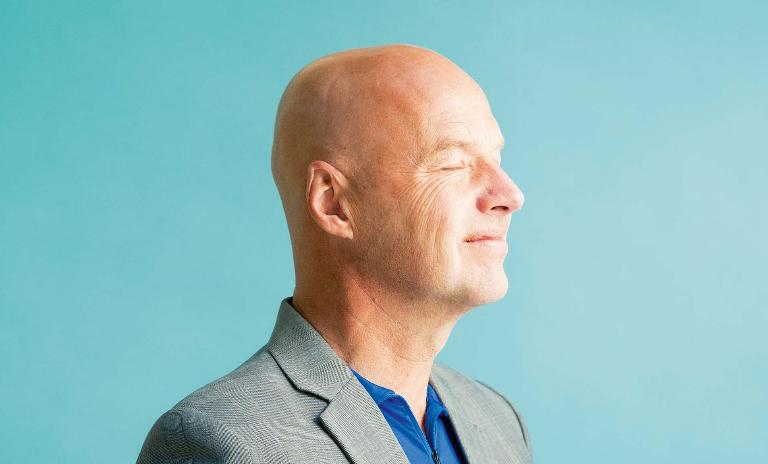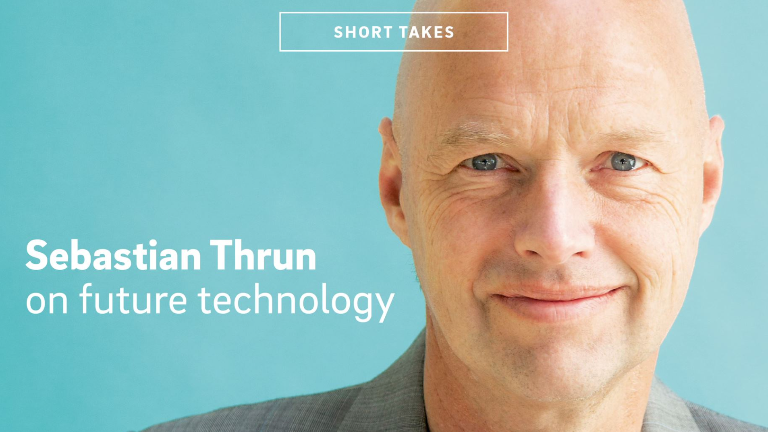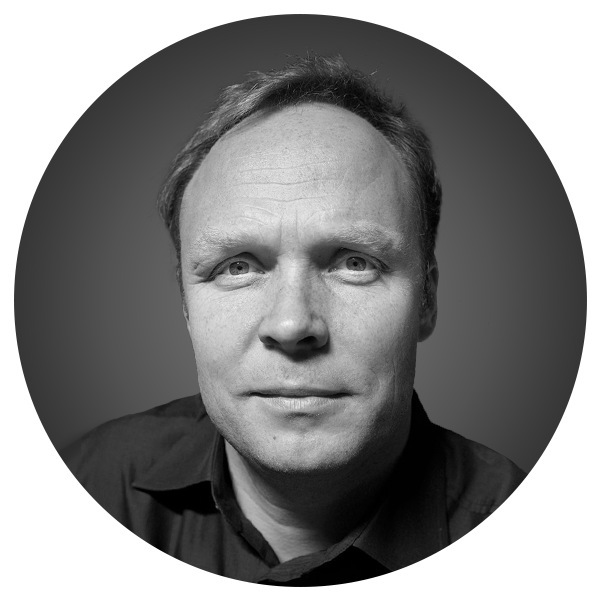Making life better
![{[downloads[language].preview]}](https://www.rolandberger.com/publications/publication_image/ta_35_001_en_cover_download_preview.jpg)
Investing in health is good for individuals and businesses. Think:Act Magazine shows how organizations can help in making life better.



Artificial intelligence and robotics pioneer Sebastian Thrun explains how he decides which ideas to pursue next and why technology's rapid pace is, if anything, not fast enough to solve global problems and alleviate suffering.
Saturday October 8, 2005, was one for the history books. That morning, for the first time, an unmanned vehicle autonomously navigated a treacherous course through the Nevada desert. It had won what the Pentagon's innovation arm DARPA had called the "Grand Challenge." The sensor-studded SUV "Stanley" pulling over the finish line didn't just put German-born computer scientist Sebastian Thrun and his team on the map. It's also widely considered the pivotal event that turned self-driving vehicles from a science fiction fantasy into real science fact. Robo-cars suddenly seemed within reach, setting off billions in investments by automotive and IT incumbents and launching dozens of startups.
"I tend to do things I'm bad at instead of the things I'm good at. Something that's a challenge for me personally gives me the possibility to grow."
Thrun can take a chunk of the credit. At 54, he has spent the better part of his life making technology that can see, think, drive and even fly by itself a reality – the kind of technology that bestows on its users what Thrun calls "superhuman" qualities. In 2003, he moved from traditional robotics stronghold Carnegie Mellon University in Pittsburgh to Stanford University in Palo Alto. Being an academic in the heart of Silicon Valley inevitably leads to entrepreneurship, and Thrun was no exception. As founder of the Google X Lab, he was a leading mind behind the search giant's efforts to develop self-driving cars, a venture that eventually became Waymo. Thrun also played a key role in the AR-enhanced but ill-fated Google Glass project as well as Google Street View.
Along the way, Thrun has also found time to start his own companies, from an online education platform called Udacity to an AI company called Cresta that is targeted at customer communication and whispers insights into the ears of call center representatives. For his latest chapter, Thrun has taken his vision of smart machines to the air. He is currently CEO of Kitty Hawk, one of the pioneers in personal air taxis launched by Google co-founder Larry Page. In a video conversation with Think:Act from his San Francisco residence, the computer scientist talks about the method behind his forays into the business world, his preference for small teams – and why technological change simply isn't happening fast enough.

What are the most important things you learned during your time at Carnegie Mellon and Stanford that you could apply in the business world?
As a scientist, you are willing to change your mind when new data arrives. That's a quality that academicians generally believe is important for furthering the truth, but in other sectors of civil society, say politics, it is usually unwelcome. It also helps that you as an academic person have an innate curiosity. You're constantly searching for deeper insights, deeper wisdoms, and that turns out to play very well as an entrepreneur.
What, in contrast, were some of the things that academia didn't prepare you for and that you had to learn, teach yourself or find mentors when you went into business?
One of the things that was completely new to me was managing people. Not just managing graduate students, which are more one-on-one relationships, but managing teams of people, at times more than 1,000. Aligning large numbers of people is a challenge that you just never had as a professor where you are in a bit of an ivory tower. You work on topics that your colleagues find interesting, but not necessarily topics that change the world.

"Every society has the opportunity to become just like Silicon Valley ... We celebrate people who failed, hire them and give them money to try again."
If you look at the various companies you've worked at, from Google X and Kitty Hawk to your own startups, what is the unifying theme that runs through all of them?
Two themes probably characterize me the best. Number one, I truly want to make the world better through my work, from the self-driving car to global access to education. But I also want to always learn something new and expose myself to situations with a learning opportunity. That means I tend to do things I'm bad at instead of the things I'm good at. Something that's a challenge for me personally gives me the possibility to grow.
How do you go about finding the areas that you think have potential and where you can turn your effort into something commercially viable?
The very first part of my thinking process is to ask if there is great, possibly new technology that can be leveraged to improve something that's very inefficient. Take education. I would argue that the way we deliver education in places like Stanford is inefficient because it doesn't reach the entire world – and to teach [the small number it does] is very expensive. This insight becomes a North Star. One thing that I often find among young students is that they do the opposite. They fall in love with the technology, then want to build a company around it. It's important that the solution we choose is the best, and it might not be the one that I like.
You are a technologist, but it sounds as if you pick business ventures from the human benefit side?
Born in Solingen, Germany, Sebastian Thrun began his career in the computer science department at Carnegie Mellon University as a research computer scientist in 1995. His contributions to the area of probabilistic robotics, a field that marries statistics and robotics, have earned him a reputation as an innovator in both academic and commercial settings.
I have worked on transportation for more than two decades and the impetus came from the fact that I lost a high school friend in a traffic accident. But a few years into my work, I asked myself what problem I was solving: making transportation safer and more accessible. Then it dawned on me that there's actually a better technical solution. That's when I switched over to Kitty Hawk, where the vision is to take traffic to the air. All of a sudden, we have ample space where you're super safe and also super fast and environmentally friendly. That's an example where – not just myself, but also speaking for my business partner Larry Page, the Google co-founder – our thinking has been shaped by continuously asking ourselves the question: Are we pursuing the right or best solution to make transportation safer, better, greener?
You've experienced work inside Google, being in charge of a large team, and various startups. Which experience matches your own style more closely?
I certainly prefer to lead a small [team] over a large team. I found that in a larger team, there are two complications. First of all, the management above you and beside you, your peer group, are all strongwilled and strong-minded people who all have their own perspectives. So at a large company like Google, you have to be able to defend yourself quite a bit. Second, you just can't have a personal relationship with everybody important in a large team. You have to align people on a daily basis that you might not even know by name. That requires incredibly good communication, and you have to be incredibly clear with your team. It gets even more tricky when you pivot.
Can you explain?
You have a team that's perfectly aligned behind one thing, and now you have to take these people with you and point them in a different direction, almost like a general who is fighting in one battlefield and it doesn't work, so he retreats and marches onto a different battlefield. You have to explain to people what's happening, convince them and lead them.
From your perspective, are there particular factors that make Silicon Valley such a great place for the innovations you've been pursuing?
Most people in Silicon Valley weren't born here, they chose this place. Their constant topic is how to make the world a better place. This place obviously is a nice ecosystem for innovation with a system of finance that makes it relatively easy for first-time entrepreneurs to fund their companies. There is a stream of very strong talent coming out of places like Stanford and Berkeley, too.
$300,000: The manufacturing cost of Kitty Hawk's Heaviside one-seat electric aircraft, its most recent model.
Does it make sense for other locations and local entrepreneurs to try and emulate Silicon Valley?
Yes. The world is full of entrepreneurs. Don't forget that opening a restaurant or a dry-cleaning business is entrepreneurship. Every society has the opportunity to become just like Silicon Valley. It's really a mindset. Are we willing to reward failed entrepreneurs? Even if it didn't work, we still celebrate these people, hire them and give them money to try again.
Automation and AI have become a big source of confusion and apprehension. Should we be worried about the robots replacing us?
We should understand that technological progress is the DNA of the free world. Technology has always done one thing: It made us stronger. Prior to the Industrial Revolution, most people worked in the fields. One farmer was able to produce enough food for one family. Then came the machines, and suddenly one farmer could provide food for hundreds of people. Only if you think the world is a zero-sum game would you take pity on the fact that many farmers lost their jobs. But what became of those people who'd otherwise be farmers? They are now airline pilots, software engineers, dentists, massage therapists. Almost every job we have today didn't exist 150 years ago. I am a firm believer that even when we start using AI to automate some of the more repetitive aspects of our work, we as people will just find much better jobs. We just have to work on our skill sets.
1:1 - The equivalent cost per mile, compared with today's cars, Kitty Hawk hopes to achieve by mass-producing two-seat aircraft to be shared by many riders. Source: The New York Times
Let's look at progress from the managerial side. Many executives confess that they feel that change driven by AI is coming at them too fast.
Let's take a piece of AI I've built: the self-driving car. There are the voices who say it has the potential to really disrupt the automotive industry and will massively reduce the number of cars. So every time there's a funeral because someone died in a traffic accident, ask yourself if change is coming fast enough. Why do we tolerate this massive human suffering and let 1.2 million people die in traffic every year? Overall, technology has been good to us and made the world stronger. Who doesn't want to have electricity in the house, access to a phone or anesthesia when being operated on? Given all the massive suffering in the world from extreme poverty or diseases and Covid-19, I would ask: Why aren't we faster in finding cures?
The public's perception of technology seems to go from euphoric celebration to "techlash." If you look at tech in 2021, is the glass half full or half empty?
I think over the last five years we have entered the single most transformational period in the history of humanity. You can graph the progress of any society as a function of the ability of people to communicate. The printing press made it possible for individuals to reach millions of people through books. Subsequently, television and radio opened up a megaphone to reach a large number of people. The Enlightenment , the scientific revolution, the complete transition of clerical power to worldly power and the rise of democracies can all be tied to people communicating. However, it was still expensive. It's just now that anybody who's able to communicate can have an audience of millions of people online without paying a single dollar, in fact, often making money in the process. You can see the effects everywhere – from users sharing reviews on Amazon to people organizing in Myanmar.
... yet all those platforms are plagued by fake news, propaganda and user radicalization ...
Companies such as Facebook have become news agencies by way of people collecting and posting what they perceive as news . That has led to all kinds of challenges, for example to tell true from false. That's something we have to learn to deal with, yet as a society we've had to do this before. When books first came out, countries like the Ottoman Empire considered the printing press evil. And countries that allowed printed books had to learn to distinguish truth from fiction, enabling great journalistic institutions to emerge as references for trust. We have to rediscover where trust comes from. Although technology certainly is an enabler, I would never blame technology alone for such a big societal problem.

![{[downloads[language].preview]}](https://www.rolandberger.com/publications/publication_image/ta_35_001_en_cover_download_preview.jpg)
Investing in health is good for individuals and businesses. Think:Act Magazine shows how organizations can help in making life better.
